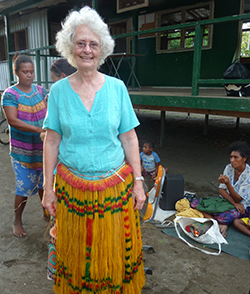
Dr Kay Owens (pictured), senior lecturer and researcher in the CSU School of Teacher Education at CSU in Dubbo, has studied for many years the ways that indigenous people in Papua New Guinea (PNG) think mathematically.
In a new book, History of Number, published by the scientific publisher Springer, Dr Owens and co-authors Dr Patricia Paraide and Dr Charly Muke from PNG set out to show both the longevity of number systems in the Pacific Islands, which includes PNG and West Papua, and the use of large numbers by these indigenous communities.
This was the life-work of former colleague Dr Glendon Angove Lean before his death. Dr Owens has continued his work to share it with the world, as she regards it as a fundamental rewriting of the history of number.
“History of Number will change the ways teachers teach number and discuss the history of number,” Dr Owens said.
“These living Pacific cultures far exceed the Romans, Egyptians, Babylonians, and Mayans for the longevity, diversity, sharing of systems, and innovations.
“The Pacific Indigenous history of number was ignored for too long because it was not written down.
My colleagues and I reveal this Pacific indigenous history through our close examination of oral histories, first contact documents, archaeological linguistics, and anthropology.”
Dr Owens recently published an article for teachers based on this work in the NSW Mathematics Association journal Reflections.
“One important reason for teachers to use this regional Indigenous knowledge is to also develop their cultural competency and respect for Australian Indigenous communities,” Dr Owens said.
“It is important not to assume knowledge does not exist if it is not written down. It also broadens mathematics teachers’ perspectives of what number systems are from the narrow focus of the Hindu-Arabic base 10 system that we use and school mathematics.”
Dr Owens has extensive experience with education in PNG, dating from 1973 when she taught mathematics at the PNG University of Technology. Her research builds on more than 15 years living and working in Lae, together with many further visits over 40 years, staying in more than 60 villages that span 52 languages across PNG.
Dr Owens’ research has focused on ethno-mathematics, particularly the counting systems, measurement and space concepts, values and ways of thinking mathematically, of hundreds of the more than 800 languages spoken in PNG. She emphasises ecocultural mathematics, visuospatial reasoning, partnerships with community, and context for education.
In her first book with Springer, titled Visuospatial Reasoning: An ecocultural perspective on space, geometry and measurement education, Dr Owens was particularly interested in how people noticed, remembered and used visual imagery and spatial knowledge to develop and use mathematics for various practical activities. This she linked to school experiences and the development from cultural identity to mathematical identity.
This topic is important in STEM subjects (Science, Technology, Engineering, and Mathematics) and she recently delivered a paper at a conference in Canberra on spatial reasoning with other international speakers.
Dr Owens recently published two other book chapters on her work in Papua New Guinea, while another on teaching mathematics in PNG is forthcoming.





Social
Explore the world of social